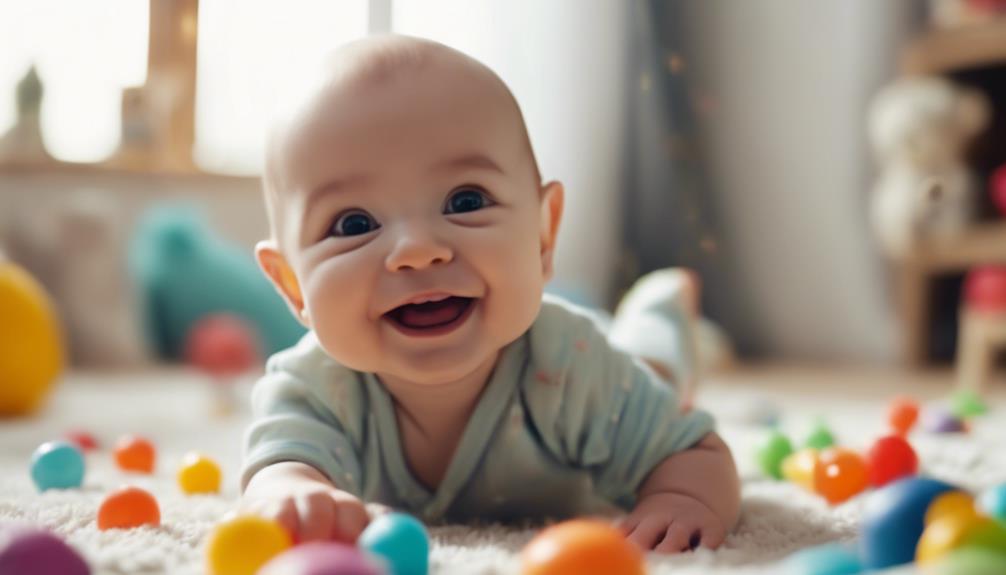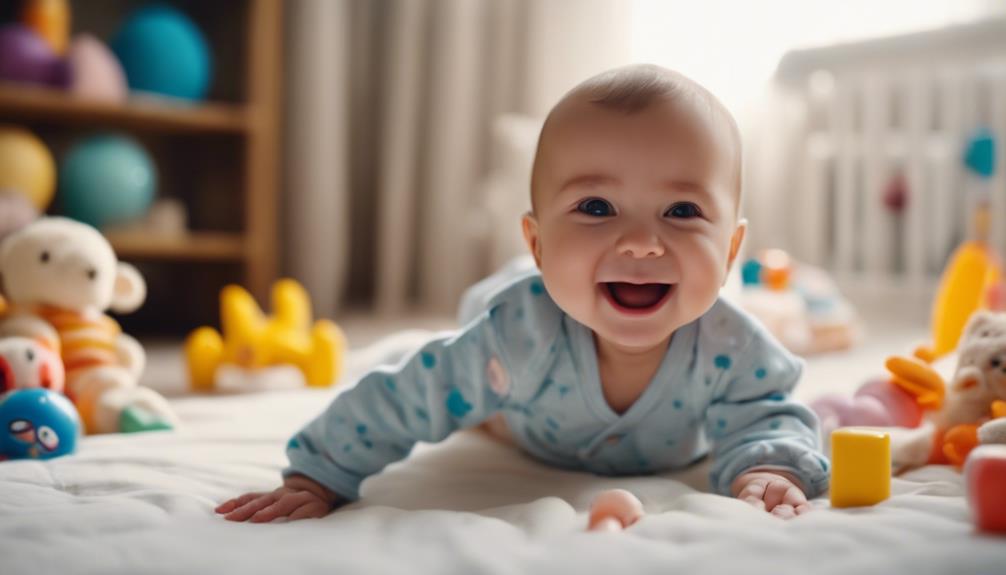Your baby’s constant happiness is likely due to their secure attachment, responsive care, and developing emotional awareness. Baby smiles indicate contentment, communication, and the formation of connections. These positive interactions contribute to your baby’s well-being and social competence, shaping their future demeanor. By responding promptly to their needs and creating a nurturing environment filled with love and support, you encourage their happiness and emotional stability. Understanding your baby’s emotional development is key to fostering their positive outlook and encouraging their joyful demeanor. Explore further to learn more about nurturing your baby’s emotional well-being.
Key Takeaways
- Babies smiling often indicate contentment and positive social engagement.
- Responsive parenting, security, and love contribute to a happy baby.
- Positive interactions shape a baby's future personality and emotional stability.
- Encouraging exploration and playtime fosters a joyful demeanor.
- Nurturing environments promote constant happiness and emotional well-being.
Baby Smiles: A Sign of Contentment
Baby smiles are often a clear indication of their contentment and happiness in response to various stimuli and interactions. If you have a happy baby who seems to smile a lot, there's generally nothing to worry about.
Research suggests that when babies smile, they aren't only expressing joy but also trying to engage with you socially. This means that your little one is learning the art of communication and connection through their smiles.
Constant smiling in babies is typically a normal part of their learning process, reflecting their positive personality traits and potentially leading to less neuroticism later in life.
Baby Smiles: Communication and Connection

When babies smile, they're actively engaging in a form of communication to connect with those around them, particularly caregivers, initiating a cycle of social interaction and bonding. Research indicates that baby smiles aren't just random gestures but intentional acts aimed at eliciting responses and forming social bonds.
This social smiling behavior typically emerges around 6 to 8 weeks as infants begin to learn how to interact and share joy with others. By responding to and encouraging a baby's smiles, caregivers can strengthen the parent-child bond and support the baby's social development. Additionally, smiling babies may exhibit early signs of positive personality traits and emotional well-being.
Understanding and reciprocating these smiles play an important role in fostering healthy social connections and nurturing the baby's sense of security and trust. Remember, when babies smile, they're exercising their innate right to communicate and connect with those closest to them.
The Science Behind Baby Smiles
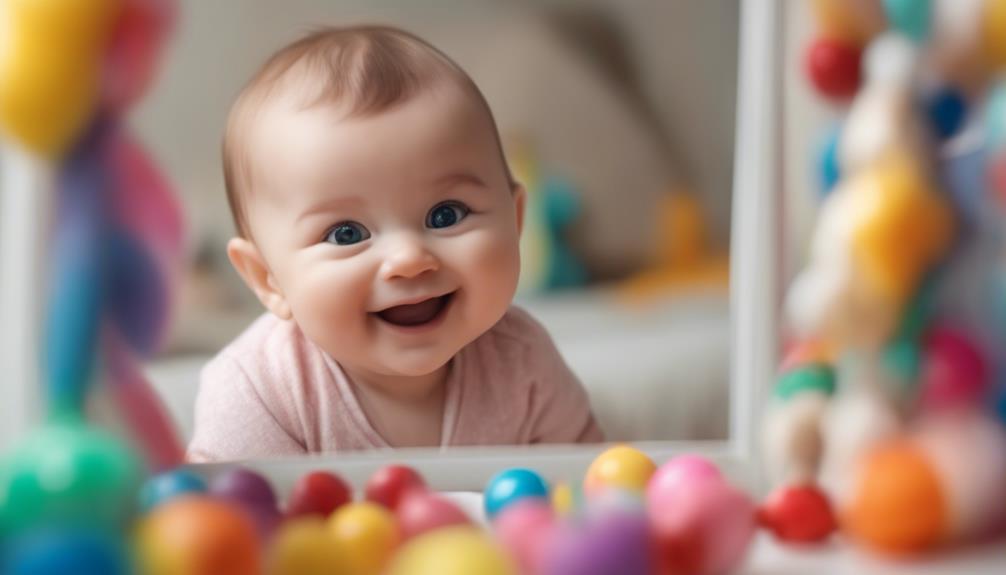
Your baby's smiles are more than just adorable expressions – they're key signals in their social development. When your little one beams at you, their brain is actively processing emotions and forming connections with you.
These joyful interactions not only spark positive emotional responses in both of you but also lay the foundation for a strong bond between parent and child.
Infant Brain Development
Understanding the science behind baby smiles sheds light on the fascinating domain of infant brain development. Baby smiles aren't just adorable expressions; they're indicative of vital brain growth. Research shows that happier babies exhibit more significant increases in IQ scores, and their early happiness can even predict future academic achievements, irrespective of socioeconomic factors.
The positive emotions associated with baby smiles play an essential role in fostering creativity, problem-solving abilities, and kindness in children. Engaging in activities that promote happiness, such as playtime and expressions of gratitude, can profoundly impact infant brain development. These smiles serve as essential communication tools for infants, aiding in their learning processes and facilitating the formation of social connections.
Social Bonding Cues
Baby smiles function as social bonding cues, allowing infants to engage with their caregivers and establish connections from an early age. When your baby flashes a smile, they aren't just displaying happiness; they're actively seeking interaction and forming bonds with you.
Here are three key points to keep in mind about baby smiles as social bonding cues:
- Timing of Smiles: Babies time their smiles purposefully to initiate and maintain social connections with others. This intentional act showcases their innate ability to communicate and form relationships right from the start.
- Emergence of Social Smiling: Typically emerging around 6 to 8 weeks of age, social smiling in babies is a significant milestone in their development. It signifies their growing awareness of the social world and their desire to engage with it.
- Reinforcement through Interaction: When you smile back at your baby, you reinforce their social behavior and encourage further interactions. This positive feedback loop strengthens the bond between you and your little one, fostering a sense of security and trust.
Positive Emotional Responses
When it comes to baby smiles, it's fascinating how these positive emotional responses serve as an essential form of social communication. The act of smiling is not just a reflex; it's a deliberate way for infants to connect with their caregivers and surroundings. Research shows that babies time their smiles strategically, aiming to elicit reciprocal smiles from those around them. This interaction forms a vital foundation for social bonding and emotional development. Additionally, early temperament, which includes frequent smiling, can predict positive personality traits in the future. Smiling babies tend to exhibit less neurotic traits later in life, highlighting the long-term impact of these positive emotional responses.
To better understand the significance of baby smiles, let's explore the science behind these joyful expressions. The following table breaks down key insights into the role of baby smiles in social communication and emotional development:
| Key Insights | Significance |
|---|---|
| Baby smiles as a form of social communication | Essential for bonding and interaction |
| Timing of smiles to elicit reciprocal responses | Establishing connections and fostering relationships |
| Early temperament predicting future traits | Link between infant behavior and adult personality |
| Baby smiles contributing to positive social interactions | Building a foundation for emotional development |
| Less neurotic traits in smiling babies later in life | Long-term impact of positive emotional responses |
Is Your Baby Naturally Happier?
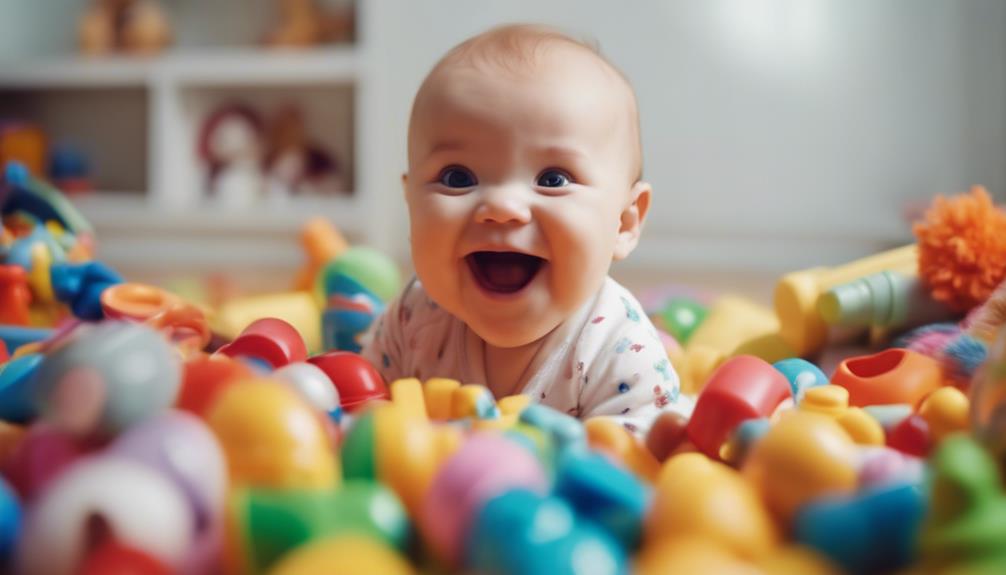
Babies displaying frequent smiles may naturally have a more positive temperament, according to research findings. This disposition towards happiness can be an inherent part of your baby's personality.
Here are three key points to take into account:
- Early Social Smiling: Around 6 to 8 weeks of age, babies start responding to interactions with caregivers by smiling. This social smile is an essential tool for building connections and communicating joy.
- Desire for Social Connection: Babies often smile to elicit smiles back from others. This behavior indicates their innate desire for social interaction and connection with their caregivers and the world around them.
- Positive Personality Traits: Constant smiling in babies is typically a normal developmental process. It can also be a sign of early positive personality traits and emotional well-being.
Understanding Your Baby's Emotional Development
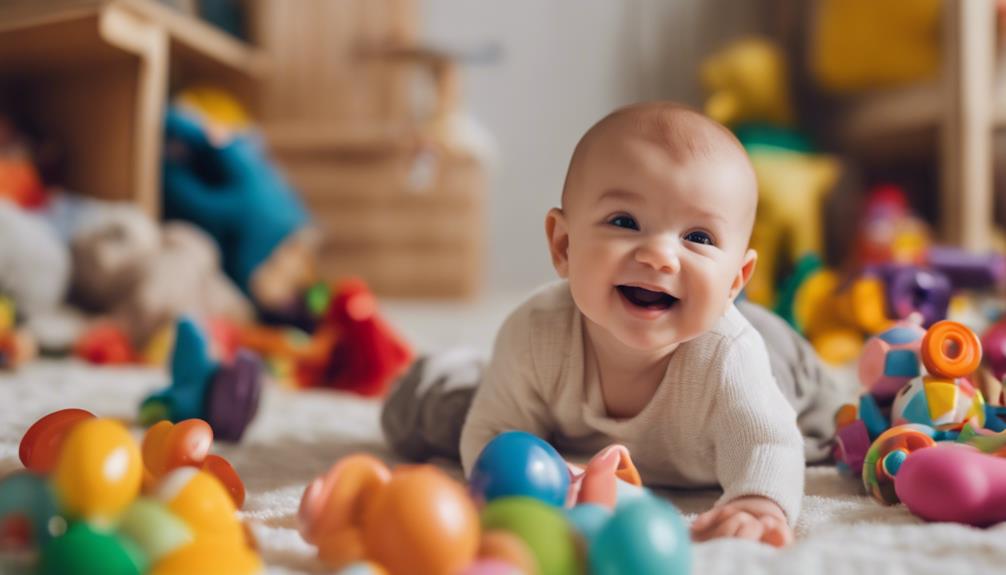
Your baby's joyful expressions, such as smiling and laughter, are important milestones in their emotional development.
These early signs of happiness and social engagement indicate that your baby is reaching key emotional milestones.
Understanding and recognizing these joyful expressions can help you nurture your baby's emotional well-being and strengthen your bond with them.
Baby's Joyful Expressions
Understanding your baby's joyful expressions is key to nurturing their emotional development from an early age. Babies start displaying joyful expressions, such as smiles, as early as 6 to 8 weeks in response to various stimuli.
Research indicates that babies smile not only as a reaction to feeling happy but also to elicit a smile back from caregivers and others, establishing early social connections. Constant smiling is a normal part of their learning process and social development, helping them communicate and interact with the world around them more effectively.
- Early Development: Babies' ability to smile early on showcases their cognitive and emotional growth.
- Social Engagement: Smiling serves as a way for babies to engage with caregivers and form secure attachments.
- Emotional Well-being: Frequent smiling can be an indicator of your baby's positive personality traits and emotional wellness, reflecting a sense of security and contentment in their environment.
Emotional Milestones Reached
Reaching emotional milestones is essential for comprehending your baby's emotional development and fostering a deeper bond with them. Around 6 to 8 weeks, babies start social smiling in response to stimuli like caregivers or familiar faces. This social smile isn't just a reflex; research suggests it's a deliberate attempt to elicit a smile back, showcasing early social awareness.
Your baby's frequent smiles indicate positive emotional development and a strong connection to you. These emotional milestones, such as social smiling, can even predict future positive personality traits and emotional well-being. By understanding and responding to your baby's smiles, you not only deepen your bond but also support their emotional growth and overall happiness.
Baby Smiles and Positive Personality Traits
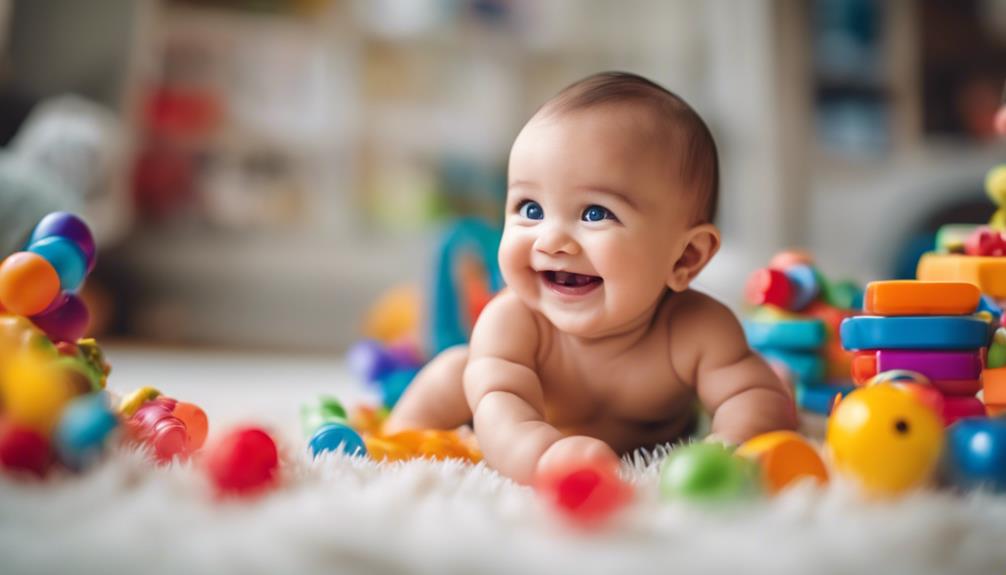
Frequent baby smiles can potentially contribute to the development of positive personality traits later in life. When your baby flashes those adorable grins, it's not just heartwarming; it may also shape their future demeanor. Here's how:
- Less Neurotic Traits: Research has indicated that babies who smile often tend to exhibit fewer neurotic traits as they grow older. This suggests that early positive emotional experiences can influence long-term emotional stability.
- Building Social Connections: Baby smiles serve as a powerful tool for infants to engage with their caregivers and surroundings. By eliciting social responses through smiling, babies can form strong bonds and develop essential social skills from a young age.
- Positive Personality Development: Early tendencies towards frequent smiling in babies can pave the way for a positive personality outlook. While not necessarily leading to increased extroversion, these positive interactions contribute to overall well-being and social competence in the long run.
Encouraging Your Baby's Happiness
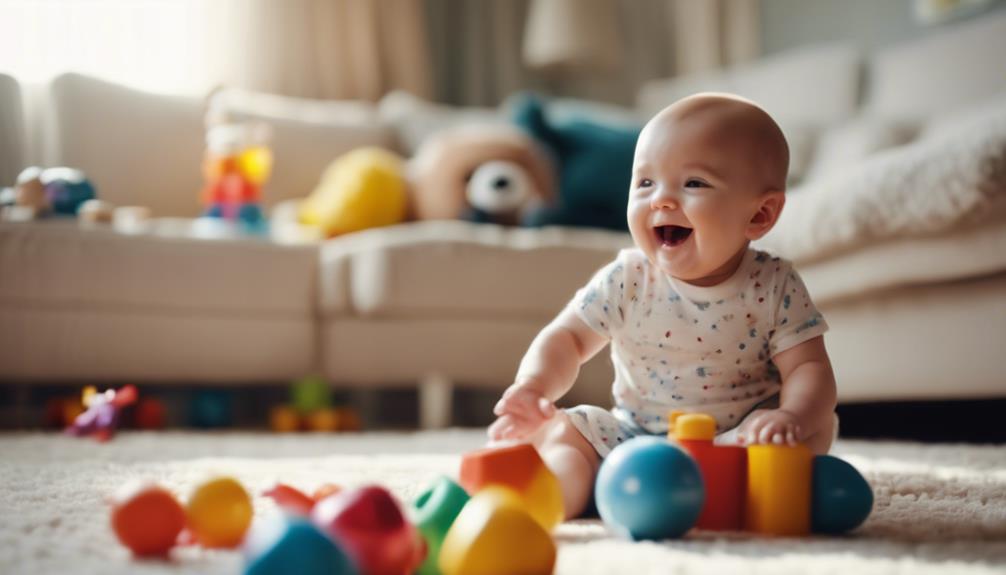
To promote your baby's happiness, focus on engaging in responsive parenting and providing comfort and security. By responding promptly to your baby's needs and cues, you create a sense of trust and security, which are essential for their emotional well-being. Encouraging exploration and learning through playtime and interactions can also contribute to your baby's overall happiness and development.
Creating a nurturing environment filled with love and support helps your baby thrive and develop positive social skills, setting the foundation for future relationships.
Positive emotions in babies not only make them happier but also lead to increased engagement in activities like playing, learning, and socializing. These positive experiences support cognitive development and lay the groundwork for emotional regulation and stress resilience in the long run.
Responding to Your Baby's Smiles
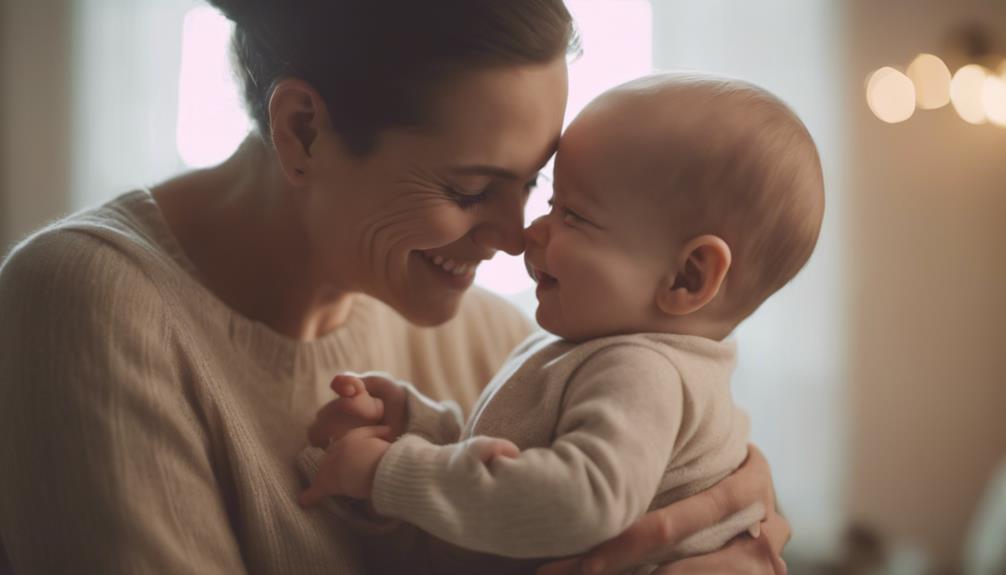
When your baby flashes a smile, it's more than just a cute expression – it's a powerful tool for social connection and emotional development. Here's how you can best respond to your baby's smiles:
- Engage: Babies time their smiles to elicit a smile back from caregivers, promoting social interaction and bonding. By reciprocating their smiles, you're encouraging this essential aspect of social development.
- Learn and Share Joy: Research shows that baby smiles are a way for infants to learn and share joy with others. By responding to your baby's smiles, you're actively participating in this joyful exchange that contributes to their emotional growth.
- Encourage Positivity: Constant smiling in babies is a normal learning process and is usually not a cause for concern. Enjoy and reciprocate your baby's smiles without worry, as they're a natural and positive part of their development journey. By responding positively to their smiles, you're nurturing their positive outlook on life.
Nurturing Your Baby's Positive Outlook
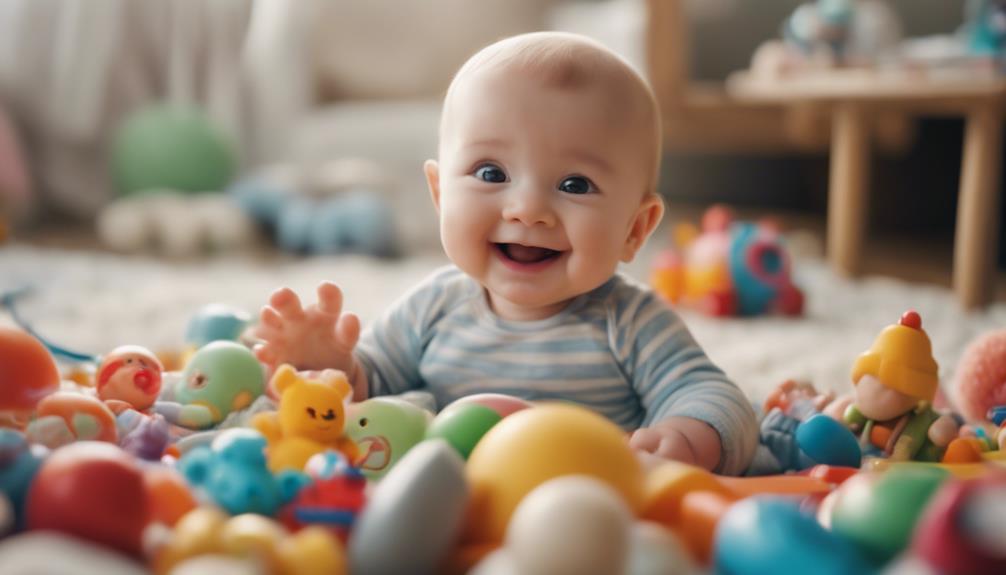
To foster a positive outlook in your baby, it's essential to create a nurturing environment filled with love and encouragement. Babies who smile frequently aren't just displaying joy but also engaging in an important learning process aimed at eliciting responses from caregivers. Research indicates that smiling in babies serves as a means to share joy with others and build social connections.
Constant smiling in infants is a positive sign of their emotional well-being and social development. Your active participation in enjoying and reciprocating your baby's smiles can greatly enhance their sense of security and overall happiness. Therefore, a consistently happy baby can greatly benefit from a nurturing environment that supports and reinforces their positive outlook on life.
Frequently Asked Questions
Why Some Babies Are Always Happy?
Babies are often joyful because they seek social connection with caregivers. Their smiles communicate happiness and elicit positive responses. Constant baby happiness is normal, aiding in emotional development and bonding in a nurturing environment.
What Are the Signs of a Happy Baby?
You notice a happy baby by their constant smiles, joyful expressions, and playful demeanor. They radiate positivity with wide grins and bright eyes, exuding curiosity and laughter. It's like sunshine in human form!
Do Happy Parents Make Happy Babies?
Happy parents do influence their baby's happiness. Your positive emotions create a nurturing atmosphere, promoting your baby's well-being. Your joy can enhance their social skills, cognitive development, and ability to handle stress, fostering a happy household.
Why Do Babies Bring so Much Joy?
Babies bring so much joy because their smiles create positive connections. When they smile at you, it's their way of engaging and learning. Don't worry, just enjoy these moments—it's a natural process fostering happiness and bonding.
Conclusion
To sum up, understanding the reasons behind your baby's constant happiness can help you nurture their positive outlook and emotional development.
So, next time you see that infectious smile, remember that it's not just a cute expression, but a sign of contentment and connection.
Keep encouraging their happiness and responding to their smiles with love and care.
After all, who wouldn't want a happy baby on their hands?


